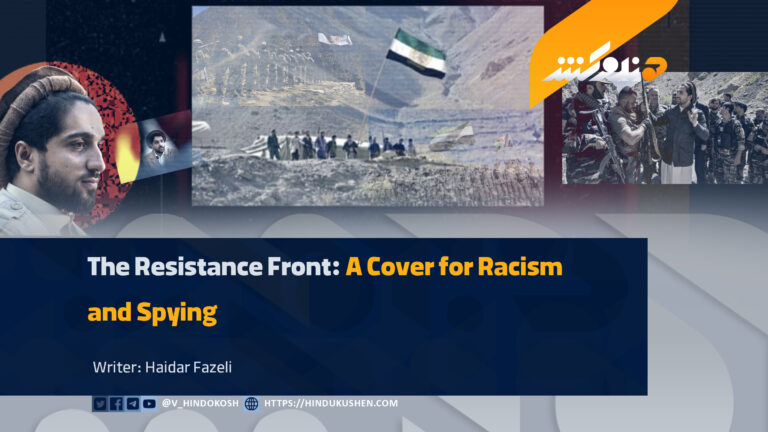Writer: Haidar Fazeli
In recent years, the Resistance Front in Afghanistan has emerged as a political player claiming to fight for freedom, justice, and the defense of the Afghan people’s rights. However, behind these slogans, there is evidence suggesting that this front not only does not serve national interests but also fuels ethnic prejudices and provides a platform for suspicious and even espionage activities.
One of the most obvious characteristics of the Resistance Front is its intense focus on a specific ethnic identity, particularly that of the Tajiks, and its disregard for Afghanistan’s ethnic diversity. This front has attempted to incite ethnic sentiments and marginalize other ethnic groups by using special symbols, language, and historical narratives.
A prime example of ethnic bias in the Resistance Front is the exclusive use of the Persian language with a Tajik accent in statements and propaganda, without any consideration for the languages of other ethnic groups in Afghanistan. The continued one-sided celebration of Tajik military commanders and the neglect of the role of other ethnic groups in Afghanistan’s past struggles indicate the ethnic bias of this front.
The verbal and derogatory attacks by members of the Resistance Front on the leaders of the Pashtun and Hazara ethnic groups on social media and affiliated media outlets demonstrate the deep-seated ethnic resentment and hatred within this group.
The Resistance Front, by exploiting the creation of virtual insecurity and political turmoil, has attempted to present itself as the sole legitimate option against the caretaker government. But in reality, by fueling unrest and media sensationalism, this front is primarily seeking to consolidate its ethnic position and is hindering the formation of a peaceful, prosperous, and peaceful society.
It has been proven repeatedly that the Resistance Front has connections with foreign intelligence agencies. The connection of this group with certain countries seeking specific interests in Afghanistan has led to the intelligence and espionage activities of this front being supported by those countries.
The biased actions of the Resistance Front in numerous instances have led to the widening of ethnic divisions. Many people in Afghanistan, especially those from non-Tajik ethnic groups, see this front as an ethnic group rather than a national movement that is solely pursuing its own limited interests.
Within Afghanistan, political and social elites, and regionally, countries that support Afghanistan’s stability have warned about and expressed concern over the destructive role of the Resistance Front. These reactions reflect the negative impact of this front’s performance on the security of Afghanistan and the region.
The people of Afghanistan know very well that true resistance must be based on national unity, social justice, and political independence. A front built on ethnic prejudice and foreign dependence can neither represent the people nor defend their rights.
Based on the performance of the leaders and affiliates of the Resistance Front, this front has become a breeding ground for ethnic prejudice and espionage. Exposing these facts and raising awareness among the people of Afghanistan can pave the way for reforms and serve the national interests and all ethnic groups of the country.
Note: The articles, essays, and comments published by the Voice of Hindukush only reflect the views of the authors & writers and do not necessarily represent the agreement of the Voice of Hindukush.




